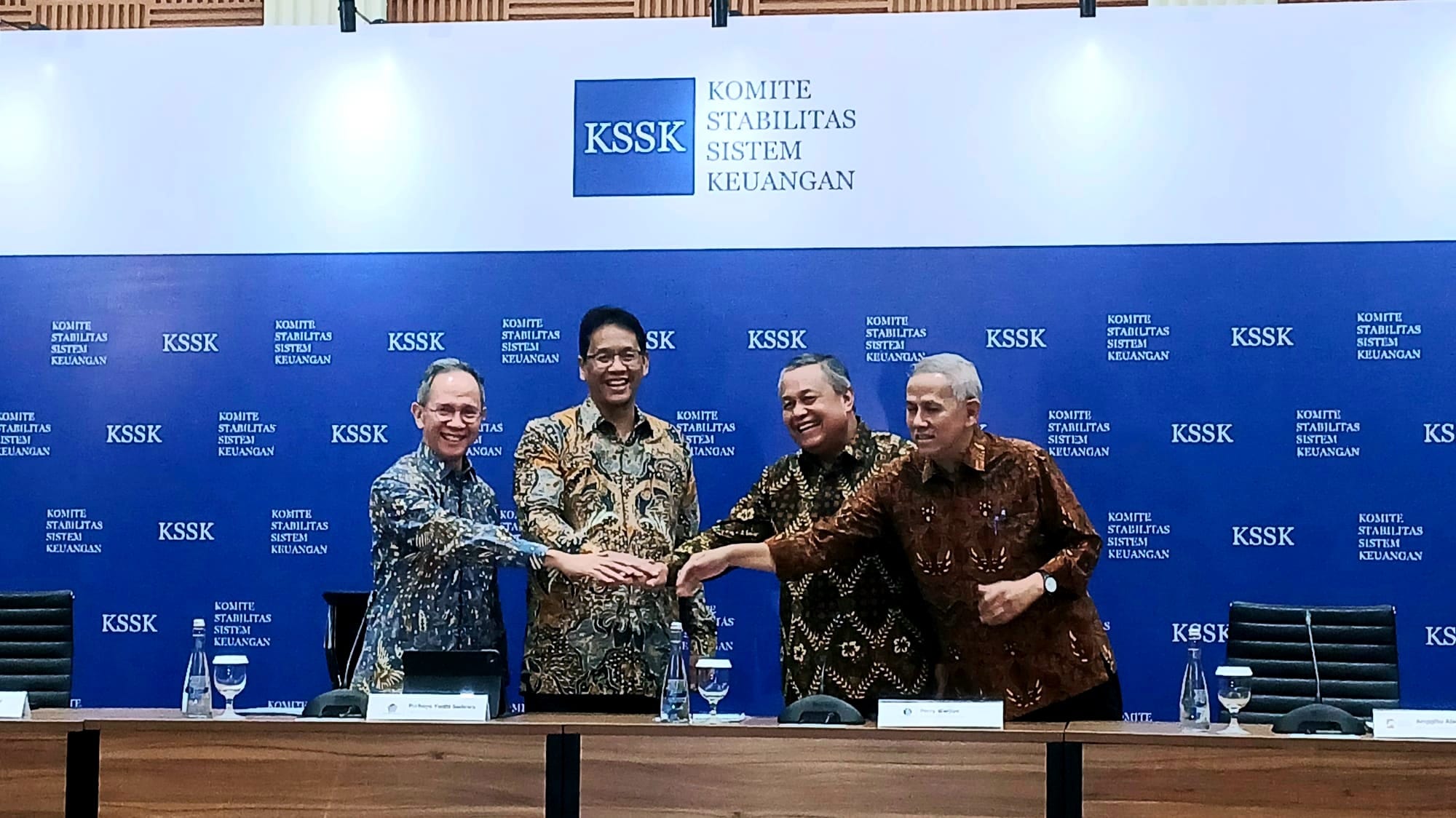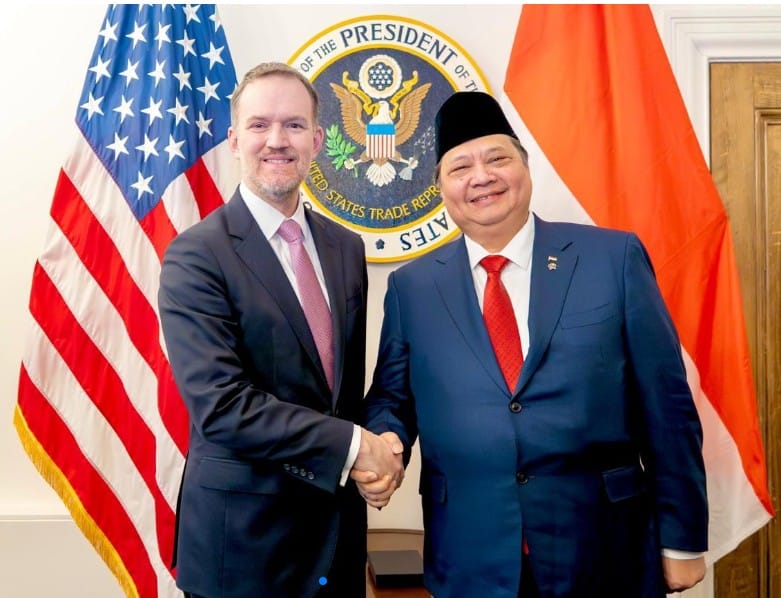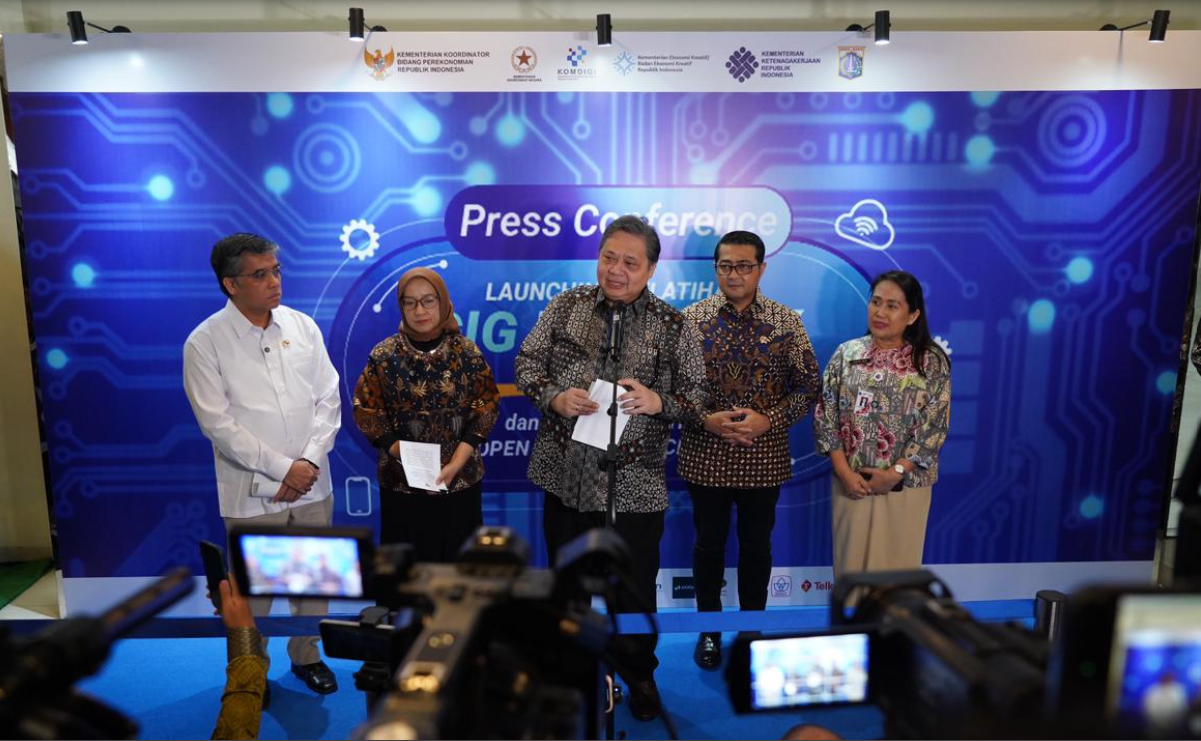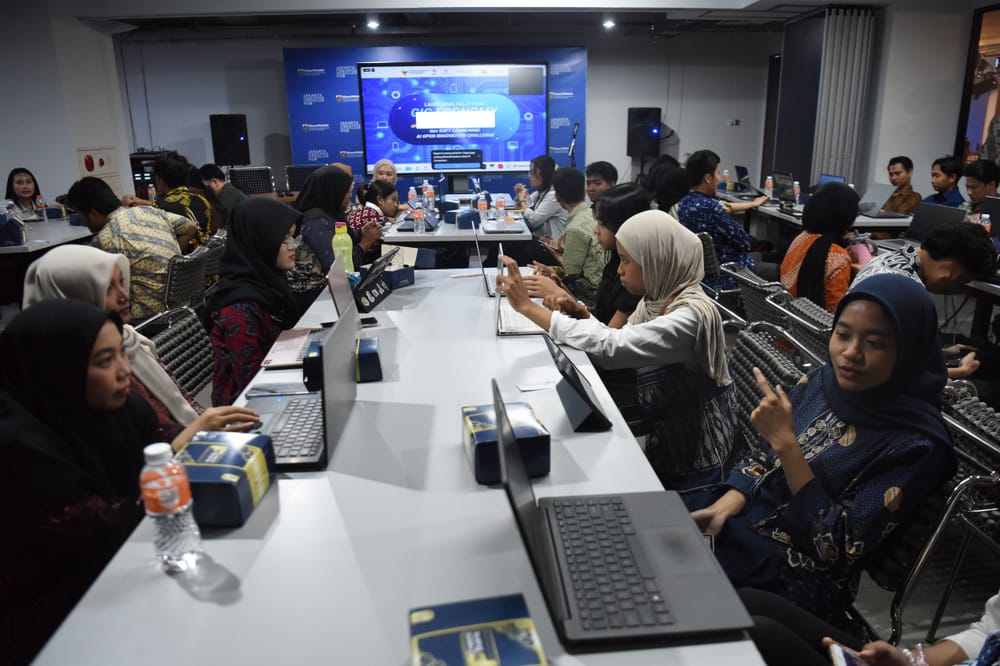The stability of the Indonesian financial system in Quarter-III 2025 is an oasis that strengthens amid global economic uncertainty and dynamics. Synergies in fiscal, monetary and financial policies are supporting factors that sparked optimism for annual economic growth in line with targets. However, there is still work to be done to ensure that this optimism becomes a reality.
The good news was conveyed at a press conference on the results of the periodic meeting of the Financial System Stability Committee (KSSK) at the Bank Indonesia Thamrin Building, Jakarta, Monday (3/10/2025). As the last KSSK meeting in 2025, this briefing briefly explained a number of economic achievements in Quarter-III 2025 based on the results of the KSSK meeting on Friday, October 31, 2025, as well as the economic projections for the ongoing Quarter-IV.
Minister of Finance and Chairman of the KSSK ex-officio Purbaya Yudhi Sadewa explained that amid the slowdown and sluggishness of the world economy due to the impact of reciprocal tariffs from the United States, Indonesia's economic growth momentum strengthened with household consumption and investment being well maintained thanks to support from the government together with monetary authorities and the financial sector.
It was recorded that retail sales grew 5.8% year-on-year (YoY) in September 2025, followed by manufacturing activity which returned to expansion with the Purchasing Manager Index at 51.2 in October 2025, and a Q3 trade balance surplus which reached USD 14.00 billion or grew 112.1% YoY, indicating the strength of the competitiveness of Indonesian products.
"Going forward, investment will continue to be strengthened, including through the role of Danantara as a private investment lever and efforts to create a competitive investment climate with the formation of the Task Force for the Acceleration of Government Strategic Programs (Satgas P2SP)," said Purbaya.
On the fiscal side, the State Treasurer emphasized that state budget spending to support consumption and production activities was strengthened through accelerating the implementation of strategic programs and providing stimulus and incentive support for government priority sectors. Until the end of October 2025, he stated that the distribution of stimulus for 35.05 million beneficiary families had reached almost IDR 20 trillion.
The positive development of economic activity and policy coordination, continued Purbaya, strengthens optimism that the economy will grow above 5.5% YoY in the fourth quarter of 2025. With the support of a stimulus of IDR 34.2 trillion, full year 2025 is projected to grow up to 5.2%.
"For me it's important, because if it's above 5.5% they say the President will give a gift," said Purbaya with a broad smile.
Meanwhile, in terms of monetary policy, Bank Indonesia (BI) Governor Perry Warjiyo stated that with foreign exchange reserves at USD 148.7 billion as of September 30, 2025, and the rupiah exchange rate strengthening by 0.21% ptp to Rp16,630 per October 31, 2025, external resilience and the rupiah exchange rate remain under control amidst global uncertainty.
Without denying the increase in October 2025 CPI inflation, which rose to 2.86% YoY, Perry assured that inflationary pressures remain within the target range with synergistic inflation control, as well as strengthening other policy mixes that support economic growth and maintain stability (pro-stability and growth), starting from benchmark interest rate cuts, macroprudential policies that encourage credit growth, to increased liquidity.
"There is still room to lower the BI Rate, but the timing and magnitude are what we are still considering according to controlled inflation and room to encourage economic growth," said Perry.
So far, Perry continued, BI is still closely monitoring the effectiveness of loose monetary policy transmission for the stability of the rupiah exchange rate and the prospect of future economic growth.
Healthy financial services
Macroeconomic fiscal and monetary stability cannot be separated from the health of the financial services sector. Chairman of the Board of Commissioners of the Financial Services Authority (OJK) Mahendra Siregar explained that with bank loans in September 2025 growing 7.7% YoY to Rp8,162.82 trillion, the accumulation of third-party funds (DPK) of banks managed to grow 11.18% YoY to Rp9,695 trillion, with current accounts, savings, and deposits growing 14.58%, 6.45%, and 12.37% YoY, respectively.
The positive performance of the stock market is evidenced by the JCI which recorded a gain of 16.36% qtq, with a record closing all-time high on Monday's trading (3/11/2025) recorded at 8,275. Fundraising in the domestic capital market has also reached Rp198.84 trillion, with a record of 27 Public Offering plans with an indicative value of Rp21.84 trillion.
Mahendra emphasized that OJK is committed to supporting the optimization of the role of the financial services sector in supporting government programs. One of them is by ensuring that information in the Financial Information Service System (SLIK) which contains the status of credit granting is not the only reference for assessing the feasibility of prospective debtors.
"Thus, SLIK functions as a neutral source of information and is not intended as an obstacle to providing credit to parties with credit quality outside the current category," said Mahendra.
Efforts to ensure the health of the financial services sector are also carried out by the Deposit Insurance Corporation (LPS) to encourage the effectiveness of bank handling. Chairman of the Board of Commissioners of LPS Anggito Abimanyu revealed that one form of support is handling 26 BPR/BPRS throughout 2024-2025, with details: 23 BPR/BPRS liquidated, 1 BPR rescued with a bail-in scheme, and 2 BPR/S in the handling process.
In addition to handling problematic banks, LPS also lowered the Deposit Insurance Rate by 25 basis points (bps) from 3.75% to 3.50% for rupiah deposits in commercial banks. However, the average bank deposit interest rate is still above the TBP, with the proportion of customers receiving deposit interest rates above the TBP increasing from 13% in 2022 to 32% in 2025.
"LPS together with other KSSK member institutions encourage banks to adjust deposit interest rates to reasonable levels, and support LPS's efforts to expand the base of people saving through increased financial literacy and inclusion," said Anggito.
The concrete result of the effort to expand the base of the saving community is evident from the growth of deposits worth between Rp5-100 million, which grew 8.55%, and deposits above Rp100 million, which grew 4.19%. This is an indication that the ability of small-scale savers is starting to increase and will continue to be encouraged as economic acceleration progresses.
There is still work to be done
KSSK's optimism regarding the impact of financial system stability on annual economic growth is indeed strongly justified. However, Deputy Director and Head of Macroeconomic Studies LPEM FEB UI Jahen Fachrul Rezki believes that the effectiveness of the impact of policies that have been taken to create better growth than Q2 growth needs to be reconsidered.
"First, we don't have seasonal factors like Q2, plus there is also pressure from demonstrations that affected people's activities. Second, the realization of government spending is quite low compared to the previous period. Third, external pressures are also still high," said Jahen when contacted by SUAR, Monday (3/11/2025).
Furthermore, Jahen stated that there is hope that public consumption can grow in the third quarter. However, although retail sales increased, the Consumer Confidence Index and motor vehicle sales figures experienced a decline. These mixed signals make the public not really know the extent to which the stability of the financial system is overcoming the pressure on the Quarter-III economy.
"On the other hand, optimism needs to be accompanied by government support for sectors that have a major role in the economy and reduce misallocation of resources. The realization of spending needs to be increased at the end of the year, because if it is very slow, the impact on the national economy will be very minimal," he explained.
Sharing Jahen's views, Head of the Macroeconomics and Financial Market Research Department of Permata Bank Faisal Rachman explained that the risks to the stability of the current financial system come from the domestic side, because even though fiscal and monetary policies have become expansive, the Indonesian economy is still operating below a negative output gap which is holding back demand-side pressures.
"The risk of an increase can arise if global uncertainty increases, causing a sharper-than-expected Rupiah depreciation and stronger gold prices, or if an increase in the money supply fails to translate into higher economic growth," Faisal told SUAR, Monday (3/11/2025).
Several ways to slow down inflation can be taken by ensuring that food supplies improve significantly and the government's plan to reduce the highest retail price (HET) of fertilizer by up to 20% proves effective, or if additional discounts for utilities (electricity, water, and/or gas) are introduced towards the end of the year.
"The main challenge for food prices today lies in how quickly the government can strengthen food security amidst increasing demand from the ongoing MBG program," concluded Faisal.






